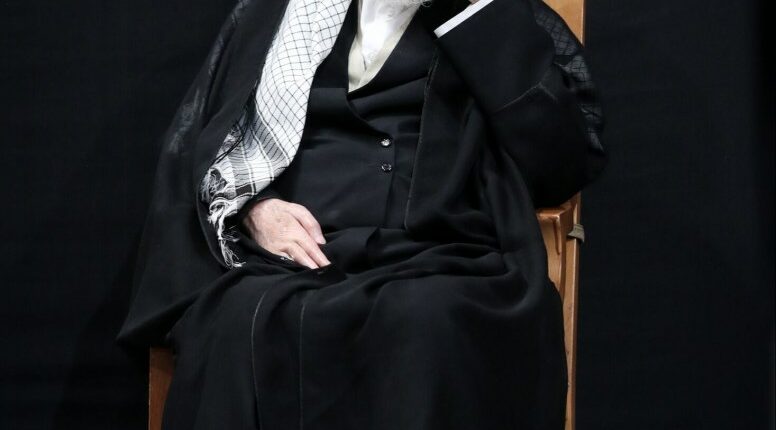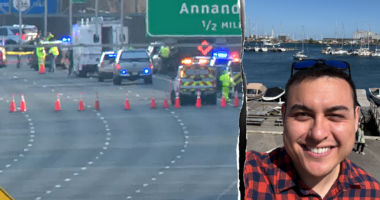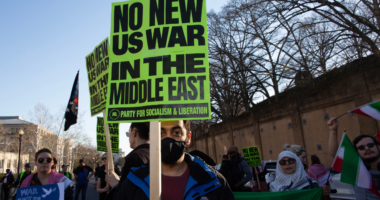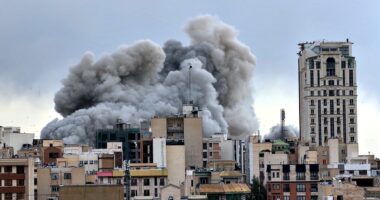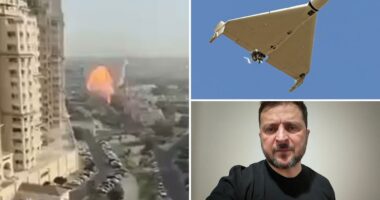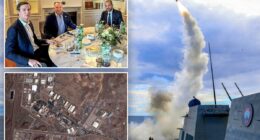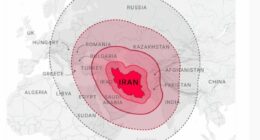Share this @internewscast.com
IRAN’S merciless regime is “fully on its heels” – leaving the Ayatollah’s days numbered, a former US ambassador says.
But the West will not be able to topple Tehran’s brutal dictatorship, Mark D. Wallace, CEO & Founder of United Against Nuclear Iran, warned.
The former UN ambassador stated that it will ultimately be up to the Iranian citizens, who have endured severe oppression for many years, to put an end to the regime’s control.
Brutal hardliners have employed harsh and merciless tactics, such as executions and torture, in a cruel attempt to crush dissent and stifle any opposition.
However, the regime’s future seems increasingly unstable, as it remains in a “volatile state” after the destruction of its nuclear aspirations by the US and Israel.
Several of Supreme Leader Ali Khamenei’s top military brass were wiped out in the 12-day war – leaving the barbaric ruler vulnerable.
Power held by Iran’s terror proxies – including Hamas in Gaza, Hezbollah in Lebanon and the Houthis in Yemen – has also been severely depleted.
Wallace told The Sun: “The regime isn’t just wounded, they’re fully on their heels.
“The very old Ayatollah has been hiding in a bunker somewhere, and there’s clearly going to be some sort of transition.
“Remember, there have only been two Ayatollahs. The question is, is there going to be a third.”
Iran’s first Ayatollah Ruhollah Khomeini seized power during the revolution of 1979 – ousting the Shah empire and transforming the state into a theocratic Islamic republic.
His bloody rule was taken over by Khamenei following his death a decade later.
Since then, Tehran has ramped up its nuclear ambitions and become an increasingly bigger threat to not only the Middle East but the West too.
The US and Israel then took decisive action last month by staging an unprecedented blitz of Iran’s nuclear bases.
It dealt a major blow to Khamenei’s top military brass – wiping out the commander in chief, deputy commander and boss of the Islamic Revolutionary Guards Corps.
At least seven other generals were killed, as well as politician Ali Shamkhani – a close confidant of the Ayatollah – and two nuclear scientists.
Khamenei cowered in hiding in a bunker as the chorus of voices fighting against repression and calling for the regime to be overthrown grew louder.
Before the 12-day war, Israel had almost diminished the capabilities of terror proxies largely funded by Ukraine.
Wallace said the “incredibly weak” Ayatollah will now be fearing his remaining generals could be spies.
“And there’s no clear succession,” he added.
“The Ayatollah is on his heels. When he finally came out [of hiding] he sounded very weak. He sounded like an 86-year-old man who had been hiding in a bunker, trying to keep his regime alive.
“Really it does call into question how long he will be there. We know he’s going to die of either natural or unnatural causes sometime in the next couple of years.
“The question is, what happens next? And I think he’s doing everything he can to try to find some sort of path to succession, to continue this revolutionary regime.”
Khamenei will now be scrambling to have a clear succession mapped out – with at least five of his top confidants thought to be in the running.
The aging despot’s son Mojtaba Khamenei is a cleric and close to the Islamic Revolutionary Guards Corps, so could be high on the potential list of successors.
Also in the running is likely to be Assembly of Experts members Alireza Arafi and Hojjatal Islam Mohsen Qomi and reform-minded presidents such as Hassan Rouhani.
The head of Iran’s judicial system Gholam-Hossein Mohseni-Eje’i meanwhile is thought of as a front-runner to take the reins.
The ruling establishment will try to immediately name a successor to Khamenei if he is killed or dies naturally.
Despite the international outcry against the regime waging war against its own people and the threat of aggression to other nations, Wallace argued the West cannot help remove the fanatics.
“The only path ultimately is for the regime to fall – but that is solely in the control of the Iranian people,” he said.
“Sadly, the Iranian people will suffer, and a good number will likely have to die for that to happen, and they’re being persecuted as we speak.
“There’s this regrettable debate going on about regime change, as if somehow we can engage in a direct strategy to engage in regime change. We can’t.
“We can do everything we can to support Iranian people and degrade the regime’s ability to threaten all of us through nuclear weapons or threaten us with terrorism and transnational oppression.
“We can also do everything we can to sanction and impede the ability of the state security apparatus to oppress its own people.
“But, ultimately, the kinetic moment when the dry leaves and the twigs of a forest catch fire, as a metaphor for revolution, is up to the Iranian people.”
Inside Iran’s brutal crackdown on its own people

by Katie Davis, Chief Foreign Reporter (Digital)
TYRANNICAL leaders in Iran have demanded citizens act as undercover informants to turn in anyone who dares oppose the regime, insiders say.
Panicked mullahs have also ordered “telecom cages” be installed around prisons as the regime wages war against its own people.
Political prisoners – largely banished to death row on trumped-up charges – have been subject to extreme torture and a disturbing rate of executions in the face of growing tensions in the Middle East.
Insiders say their treatment is being weaponised to deter opposition.
The fight against repression has loomed large for decades in the rogue state – but the so-called 12-day war last month has made the barbaric Ayatollah more fearful than ever of being toppled.
With Ali Khamenei’s grip weakened by the unprecedented Israeli and US blitz, the incapacitated supreme leader has discharged fresh hell on his own people in a corrupt bid to stifle uprising.
Sources inside Iran told The Sun how a direct alert has been issued to the public, urging them to report any activity linked to resistance groups of the People’s Mojahedin Organisation of Iran (PMOI/MEK).
Regime loyalists have been implored to act as informants – compiling detailed reports with photos, times, locations, licence plates and facial features of suspected individuals.
READ MORE HERE
